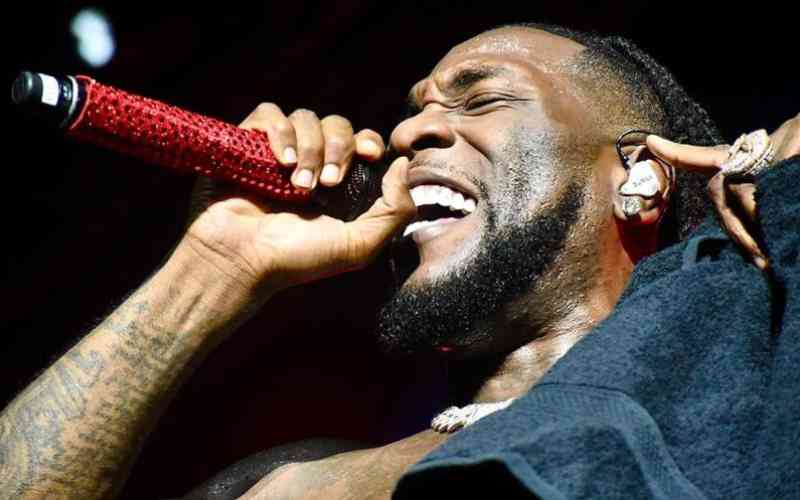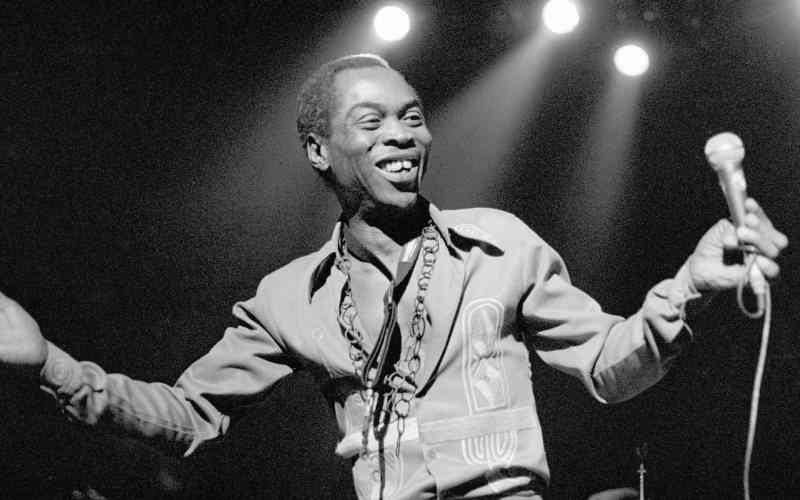
In the early 2000s, a vibrant music genre called Afrobeats emerged from Nigeria. By the late 2000s, Kenyans were hooked.
We have always been huge supporters of music from outside the country. American Country music had its day back in the 70s, then Lingala from The Democratic Republic of Congo exploded in popularity in the 80s and 90s. Today, Afrobeats from Nigeria is one of the most popular genres in the country.
Having a 'Naija night' where Nigerian music, specifically Afrobeats, plays all night, is a great way to ensure that your club is packed with revellers singing along to every word, despite a lot of the lyrics being in Pidgin.
Billy Ochieng, one such mega fan, says it is the only kind of music he can listen to.
"I used to listen to Afrobeats in the old days. The vibes and beats were very satisfying so that drew me in, but it wasn't until the era of artistes like Wizkid and Davido that I got into it. I have been a fan since then. Afrobeats brings a smile and happiness no matter what's stressing you, trust me," he says.
It is not just in Kenya where Afrobeats has found such acceptance, according to Mackinlay Mutsembi, a producer, trumpeter and Managing Director of Nairobi Horns.
"It is very popular and has a global appeal going by trends on social media, streaming, and all," he says.
The statistics from streaming platforms back him on this. On Spotify, the genre has grown by 550 per cent since 2017, and it was streamed more than 13 billion times in 2022.
"This year alone, the genre has been played for more than 223 million hours with streams exceeding 7.1 billion," says Jocelyne Muhutu-Remy, Spotify's Managing Director for Sub-Saharan Africa.
Due to this massive popularity, the streaming platform recently launched a site dedicated exclusively to it. The site, dubbed 'Afrobeats: Journey of a Billion Streams', tracks all things related to the genre, from its origins in Ghana, its popularisation in Nigeria, its fusion with other genres as well as how it has become one of the continent's biggest cultural exports.
"I think it has become a truly global music brand, and the US and Europe is trying to tap into the sound as well in their production," says Mutsembi.
Afrobeats seems to have come from nowhere and exploded in popularity, but Mutsembi says that this success did not happen overnight.
"I feel what has worked for them is having multiple ambassadors over a long time, and with a seemingly endless line of guys ready to step in, take the spotlight and keep the torch burning," he says.
People in Nigeria's music scene agree. Ifeanyi Okafor is Operations Manager for Inicross, an entertainment company in Nigeria. He previously worked as a talent manager and A&R, and echoed Mutsembi's sentiment when he spoke to the Saturday Standard.
"There are various reasons. Different eras have played a huge role towards the popularity of the Afrobeats genre. Some people laid the groundwork for what we are reaping now," says Okafor.
"Back in the day, we had people like Fela Kuti, the pioneer of the Afrobeat sound, King Sunny Ade who made juju music, Majek Fashek and a few others that were global superstars."

In the 2000s, a new generation of Nigerian artistes inspired by the likes of Fela Kuti and more modern sounds came onto the scene. These artistes played a critical role in shaping the sound of what would later become known as Afrobeats.
"People like 2Face Idibia and others before him did the groundwork. With the commercial success of his solo debut album 'Face2Face' with classics like 'African Queen', 2Baba became the first winner of MTV EMA Best African Act. It changed the landscape of the Nigerian music scene," says Okafor.
"We also had D'banj, Don Jazzy, P-Square and others. They also amplified the afrobeat movement and had strategic international partnerships and things started to flow into the global scene. While this was happening, we had artistes that were consistent with the releases in Nigeria, the likes of Tiwa Savage, Wizkid, Davido, Burna Boy, Tekno, Pato, Flavour, Olamide, Tekno, 9ice who have all gone on to be international superstars, filling up stadiums, arenas all around the world."
All these artistes added bricks to a foundation that took decades to build. Okafor says that when he started working in the music industry many years ago, the industry lacked proper structure and barely had any acceptance.
"I mean for many people then it was not so cool to be an Afrobeats listener/consumer," he says.
It is a whole different story now, and as he says, there are many other reasons for the genre's success. To understand that, one has to go back to its origins. Exactly where it began is not clear cut, with some sources saying that it originated in Ghana, while others say it got its start in Nigeria.
While Afrobeat, Afrobeats' precursor, was pioneered by Nigerian musician Fela Kuti in the 1970s, another influence on Afrobeats is highlife, a music genre that originated in Ghana in the early 20th century.
Afrobeats is also influenced by hip-hop, R&B, dancehall, and reggae. All these genres and styles provided the foundation and influence that contributed to the creation of the sound that defines Afrobeats.
Okafor says that this is one of the contributors to the genre's success.
"In Afrobeats, we take different sounds and infuse them into our sound. That is what we call Afro-fusion. When we hear a sound that we like, our producers create and use it, and we roll with your sound," he says.
To illustrate this, he gives a surprising, yet relatable example - Gengetone.
"When I was managing the band Alternate Sound, we did a Gengetone mix. It blew up in Kenya during the pandemic. There is a similarity between Gengetone and Afrobeats - the pulse, the tempo and the beat. It makes you nod your head and bop to it," he says.
"So let's say, tomorrow Gengetone becomes a big sound outside Kenya. We are the headquarters of African music, so lots of your artistes will come here to feature us and boom! We adopt the sound and we move with it. I love the Gengetone sound and would want to A&R a Gengetone project sometime," he says.
Given how popular the band Alternate Sound were in Kenya for a hot minute when they did the Gengetone mixes, one starts to see how the genre makes its way into people's hearts all over the world. It is a unique sound, yet it has an element of familiarity to it, whoever and wherever you are in the world.
"With the streaming era came the likes of Burna Boy, Tekno, Patoranking, Mr Eazi, and others, and the sound started getting more popular. And now we have Rema, Fireboy, Omah Lay, Ayra Stark and so on," says Okafor.
Ultimately, one of the major reasons for the genre's success is good old hard work, consistency and a very appealing sound.
"We continuously create music. Look at Burna Boy for example. He has been on the road for years, on back-to-back tours. Rema is so hardworking with a very intentional and creative team. Even the ones who are not A-list artistes are putting in the work and there are many, and even the older ones still have a niche fanbase and are still releasing quality projects," says Okafor.
"Our producers deserve a lot of credit. The Likes of Don Jazzy, Sarz, Masterkraft, Shizzi, Cohbams and the younger ones like Ppriime, Tempoe, Kel - P, who are behind some of the biggest Afrobeats records ever."
Today, Afrobeats is so successful that seemingly everyone wants in on it - from local artistes in Nigeria to the biggest artistes on the planet.
Collaborations between Afrobeats artistes and global stars like Drake, Beyonce, and Ed Sheeran have popularised the genre even more and expanded its fan base.
In May 2016, Wizkid became the first Nigerian artiste to land on Billboard's Hot 100 when he featured on Drake's 'One Dance'. He delivered another first when his song, Essence, featuring Tems, became the first Afrobeats song to chart on Billboard's Hot 100, peaking at number 9. Billboard ended up launching a chart dedicated exclusively to Afrobeats, 'The Billboard's US Afrobeats Chart' in March last year.
More recently, celebrated artiste and Instagram's most followed woman, Selena Gomez, posted on Instagram saying of Afrobeats star Rema, "This man changed my life forever...Rema, thank you for choosing me to be a part of one of the biggest songs in the world. Love you forever." The post attracted over 8 million likes.
The two collaborated on the remix of Rema's mega-hit, Calm Down. The remix with Gomez was released just 10 months ago and currently has a whopping 575 million views on Youtube, while the original has an equally incredible 506 million views. Both versions are on track to become the most viewed songs on Youtube.

Afrobeats has in turn influenced and inspired artistes from various genres around the world. It has also influenced dance styles and popularized new dance crazes through music videos and social media, the latter being another factor that its success is credited to.
What do Nigerians think about this incredible feat?
"It's been great because it feels like the sound which took many years of consistency is finally getting the appreciation it deserves. We are gradually getting global penetration. You can see what Rema is doing on charts and radio. Big projects are dropping every day. Omah Lay, Asake, Rema etc are all here. Burna Boy is so amazing and he is pushing the Afrobeats culture the right way," says Okafor.
Afrobeats has also had a significant impact on the music industry, creating opportunities for artistes, producers, and other professionals within the music ecosystem. The success of Afrobeats artistes has attracted investment and opened doors for African musicians to gain recognition and exposure on a global scale.
"Back when I started in this industry, you had to either be a musician, a producer, a road manager - the basics," says Okafor. "Now we have many different jobs in the industry - some are graphic designers, others are mixing engineers, people are in marketing, we have entertainment lawyers, we have accountants - so many things because of the investment in the ecosystem. That's part of the growth."
Afrobeats is clearly on the up and up, and while he admits that they still are not where they want to be yet as an industry, they are getting there.
Muhutu-Remy feels the same way, evidently reading the writing on the wall, when she says, "There is no doubt that Afrobeats as a genre is here to stay, and will only continue to shatter more ceilings."
 The Standard Group Plc is a multi-media organization with investments in media
platforms spanning newspaper print
operations, television, radio broadcasting, digital and online services. The
Standard Group is recognized as a
leading multi-media house in Kenya with a key influence in matters of national and
international interest.
The Standard Group Plc is a multi-media organization with investments in media
platforms spanning newspaper print
operations, television, radio broadcasting, digital and online services. The
Standard Group is recognized as a
leading multi-media house in Kenya with a key influence in matters of national and
international interest.
